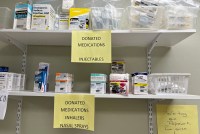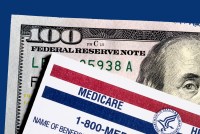Latest KFF Health News Stories
Cancer Patients Face Frightening Delays in Treatment Approvals
Delaying cancer treatment can be deadly — which makes the roadblock-riddled process that health insurers use to approve or deny care particularly daunting for oncology patients.
Deep Flaws in FDA Oversight of Medical Devices, and Patient Harm, Exposed in Lawsuits and Records
Thousands of medical devices are sold, and even implanted, with no safety tests.
A New Test Could Save Arthritis Patients Time, Money, and Pain. But Will It Be Used?
Stories of chronic pain, drug-hopping, and insurance meddling are all too common among patients with rheumatoid arthritis. Precision medicine offers new hope.
‘They See a Cash Cow’: Corporations Could Consume $50 Billion of Opioid Settlements
As opioid settlement dollars land in government coffers, a swarm of businesses are positioning themselves to profit from the windfall. But will their potential gains come at the expense of the settlements’ intended purpose — to remediate the effects of the opioid epidemic?
‘Financial Ruin Is Baked Into the System’: Readers on the Costs of Long-Term Care
Thousands of people shared their experiences and related to the financial drain on families portrayed in the “Dying Broke” series, a joint project by KFF Health News and The New York Times that examined the costs of long-term care.
As Foundation for ‘Excited Delirium’ Diagnosis Cracks, Fallout Spreads
Major policy changes and disavowals have made this a watershed year for curbing the use of the discredited “excited delirium” diagnosis to explain deaths in police custody. Now the ripple effects are spreading across the country into court cases, state legislation, and police training classes.
Programas ponen los medicamentos sin usar en manos de pacientes que los necesitan
Recogen de centros de salud, residentes, farmacias o prisiones los medicamentos sin abrir y sin caducar que se acumulan cuando los pacientes son dados de alta, cambian de medicina o mueren, y los redistribuyen a pacientes vulnerables.
Encuesta revela que persiste la discriminación racial en la atención médica
Casi la mitad de los pacientes hispanos, los Indio americanos y los nativos de Alaska sienten que no se los respeta.
Dodging the Medicare Enrollment Deadline Can Be Costly
As open enrollment ends, many people are tuning out. They could wind up with a surprise next year: higher costs and less access to health care providers.
These Programs Put Unused Prescription Drugs in the Hands of Patients in Need
States and counties look to expand programs that accept donations of unused surplus drugs from places like nursing homes and hospitals and redistribute them to low-income and uninsured residents.
Many People of Color Worry Good Health Care Is Tied to Their Appearance
Many people from racial and ethnic minority groups brace themselves for insults and judgments before medical appointments, according to a new survey of patients that reaffirms the prevalence of racial discrimination in the U.S. health system.
Explosive DeSantis-Newsom Debate Reflects Nation’s Culture Wars
The two governors exchanged heated verbal barbs when they faced off in a wide-ranging debate that covered various health-related topics, from abortion to gun violence.
‘Forever Chemicals’ Found in Freshwater Fish, Yet Most States Don’t Warn Residents
At least 17 states have issued PFAS-related fish consumption advisories, KFF Health News found. But with no federal guidance, what is considered safe to eat varies significantly among states, most of which provide no regulation.
‘Forever Chemicals’ in Thousands of Private Wells Near Military Sites, Study Finds
New research finds that private wells near more than 82% of select military sites were contaminated with PFAS chemicals.
Health Care Is Front and Center as DeSantis and Newsom Go Mano a Mano
Florida’s Republican Gov. Ron DeSantis and California’s Democratic Gov. Gavin Newsom will square off in a first-of-its-kind debate on Nov. 30. KFF Health News compared the political rivals’ health care positions, showing how their policies have helped — or hindered — the health of their states’ residents.
KFF Health News editor-at-large for public health Céline Gounder discusses how families of transgender youth are uprooting their lives due to anti-trans policies and their ripple effects.
Extra Fees Drive Assisted Living Profits
The add-ons pile up: $93 for medications, $50 for cable TV. Prices soar as the industry leaves no service unbilled, out of reach for many families.
Why It’s So Tough to Reduce Unnecessary Medical Care
Treatments that don’t help patients, and may even harm them, are difficult to eliminate because they can be big sources of revenue.
La resistencia a empezar más tarde tiene menos que ver con dificultades logísticas y financieras, sobre todo en aspectos básicos como el transporte escolar.
Science Says Teens Need More Sleep. So Why Is It So Hard to Start School Later?
Sleep deprivation in adolescents is linked to mental health struggles, worse grades, traffic accidents, and more. That’s why states such as California and Florida have mandated later high school start times. But opposition to later times is less about the science than it is about logistics and costs.























